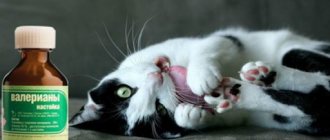8351Pavel
2
Owners of furry meowing pets may encounter any deviations or disturbances in the health of their pets. This deviation can be loose stools in cats, or, more simply, diarrhea. Can cats take Loperamide? – a question that arises among owners who urgently want to help their pet, but do not have suitable medications for animals in their veterinary medicine cabinet.
Diarrhea in cats can occur due to poisoning, poor diet, infection, parasites, allergies or gastrointestinal diseases. As a result of prolonged diarrhea, the cat becomes dehydrated, which threatens to impair blood circulation in the brain. For this reason, the alarming and dangerous symptom should be immediately eliminated, and Loperamide can help with this.
© shutterstock
What is Loperamide?
Loperamide is a drug for the symptomatic treatment of diarrhea. However, this is the abbreviated name for the substance loperamide hydrochloride, which is on the Model List of Essential Medicines compiled by the World Health Organization.
Did you know? « Loperamide
»
was developed in 1969 by employees of Janssen Pharmaceuticals.
This is an active substance that leads to the desired result in the treatment of diarrhea. The element is found in various drugs that are considered analogues and have an antidiarrheal effect.
When is it used?
It is necessary to give a cat Loperamide for diarrhea only if the symptom threatens the pet with dehydration of the body, as a result of which blood circulation in the brain is disrupted. Therefore, veterinarians usually prescribe medicine for cats for prolonged dangerous diarrhea caused by dysbacteriosis or resulting from a sudden change in diet. Veterinarians also prescribe Loperamide for stool problems caused by bacterial and viral infections, as well as various diseases of the gastrointestinal tract.
Chemical composition and characteristics of the drug
The composition of the drug "Loperamide":
- loperamide hydrochloride (2 mg based on 100% substance);
- lactose monohydrate;
- potato starch;
- calcium stearate.
The active substance, loperamide hydrochloride, impairs intestinal motility. At the same time, it increases the transit time of intestinal contents through the digestive tract and improves the ability of the intestinal walls to absorb moisture. The anal sphincter comes into a state of tone, delaying fecal incontinence. Thus, Loperamide provides symptomatic treatment and helps control the urge to defecate.
Action of Loperamide
Diarrhea in cats is a fairly rare occurrence, but can occur with certain disorders in the gastrointestinal tract. In veterinary medicine, there are not many drugs for this disease, and therefore sometimes veterinarians are forced to use medications intended for humans to treat animals. Loperamide is a human drug used for digestive disorders and diarrhea . Its action is to suppress intestinal receptors that are responsible for peristalsis: the contraction activity of the intestine decreases and its walls relax.
Loperamide should be given to cats only in extreme cases, when progressive diarrhea threatens dehydration, and other remedies do not help. It should also be remembered that in case of poisoning, Loperamide does not fight toxins, but inhibits their release through feces. This means that treatment for diarrhea in cats must be comprehensive and aimed not only at suppressing the symptoms, but also at their cause. Loperamide is an available analogue of Immodium.
Composition of the drug:
- Loperamide hydrochloride (active ingredient);
- Starch;
- Talc;
- Lactose;
- Magnesium stearate;
- Aerosil.
© shutterstock
Loperamide for a cat with diarrhea may not be needed if the cause of diarrhea is not related to poor diet or allergic intolerance to any product. In such cases, treatment consists of a special diet and elimination of allergic foods. But if a cat’s loose stool is associated with poisoning, a disease of the digestive system or a parasitic infection, then complex treatment of the animal will be required under the supervision of a specialist, using Smecta, which is an excellent absorbent agent.
Is it possible to give a cat Loperamide for diarrhea?
Loperamide is intended primarily for people. However, in some cases the drug can be given to animals, including cats. It is important to remember that diarrhea is not a disease, but a symptom. Initially, you need to cure the cause of its appearance. Diarrhea is often caused by poor diet. To alleviate the cat's condition, the use of medication is allowed. However, this should not be the only treatment.
First of all, enterosorbent and temporary refusal of food will get rid of the disease. In cases where diarrhea does not stop for a long time and is combined with vomiting, the presence of an infectious pathogen in the microflora is possible. However, it is impossible to make a diagnosis on your own; the cat must be shown to a veterinarian.
Important! If there are black impurities and blood in the cat's feces, it is prohibited to give Loperamide. Such symptoms indicate internal bleeding, the animal should be immediately shown to a veterinarian.
In case of diarrhea, it is quite difficult to bring the animal to the clinic due to involuntary defecation. It is in this case that it is permissible to give the cat medication. Loperamide may be prescribed by a veterinarian during treatment. This is a symptomatic auxiliary therapy that can alleviate the animal’s condition.
Indications for use
It is not recommended to give loperamide to a cat for diarrhea, but in extreme cases it can be given. When there is no other alternative drug, this drug can be used to treat loose stools in an animal. There are a number of situations in which first aid medicine can be used:
- When diagnosing a cat with spastic colitis or irritable bowel syndrome. If your pet has this disease, caused by a dysfunction of the nervous system, then intestinal upset may occur. This occurs due to persistent spasms of the muscles of the intestinal walls, which in turn leads to an inflammatory process of the mucous membrane. You cannot give a kitten Loperamide.
- Loose stools as a result of severe stress. If your pet lives in an apartment and does not go for walks, psycho-emotional stress may occur. This condition is caused by the fact that the pet does not perform the functions inherent at the genetic level. For example, instead of getting food themselves, the owner brings food on demand and in sufficient quantities. The pet's basic needs are suppressed.
- Wrong diet. Changing a cat's diet or drinking milk can cause diarrhea. If diarrhea is caused by this phenomenon, then it is worth giving the drug Loperamide and putting the pet on a starvation diet for a day.
The benefits and harms of the drug
The benefit of the drug is manifested in the deterioration of intestinal motility. Fecal masses no longer come out spontaneously. Thus, the animal’s condition improves, which allows the basic treatment to be carried out effectively.
Harmful effects are possible in the following cases:
- overdose;
- self-prescription without consulting a veterinarian;
- lack of primary treatment.
If the cause (poisoning, bleeding or infection) is not treated, the animal’s condition will worsen.
In case of overdose, side effects may occur. You will be interested to know what diseases cats suffer from.
Basic characteristics
Have you seen the Imodium commercial on TV? If yes, then you already have an idea about the composition we are describing. In fact, this is a cheap analogue of the advertised brand. It is sold under the names Imodium/AD, Pepto Diarrhea Control, Kaopectate II Caplets. All this is the same thing. Differences in prices and manufacturer.
Available in the form of capsules, tablets and gel for oral use. Used to eliminate diarrhea and inflammatory diseases of the entire gastrointestinal tract. It has nothing in common with anti-inflammatory corticosteroids, although from a chemical point of view there are certain similarities.
Important! Not recommended for administration to cats! For dogs, by the way, there are no such restrictions. If there is any alternative, use it. In the case where a decision has been made to prescribe this particular remedy, this must be done under the strict supervision of a specialist.
The advantages include accessibility: you can buy it at any pharmacy. The action is based on the compound’s ability to inhibit intestinal motility, as a result of which the evacuation of feces is significantly slowed down. At the same time, the product simultaneously impedes the absorption of high-molecular substances of protein and inorganic nature. In Russian, water in the intestines will be absorbed, but toxins will not (but not everything is so good in practice).
Please note that this drug should be given to your pet for a maximum of two days. If no positive results are observed, we recommend that you contact the clinic immediately. Most likely, the diarrhea in this case is associated with something more serious than ordinary food intolerance or overeating. In addition, at the same time, we advise you to feed the cat exclusively with liquid broths, refusing more “serious” food.
Scheme and methods of application
Loperamide should not be administered to kittens until they are 3 months old. If necessary and prescribed by a veterinarian, the drug can be used in 6-month-old animals. After six months, cats in most cases accept the medication normally.
We recommend that you familiarize yourself with the drugs for the gastrointestinal tract: “Enterofuril”, “Furazolidone”, “Smecta”, “Fthalazol”.
Veterinarians recommend the following dosages:
- kittens up to 1 year old - 0.1 mg per 1 kg of weight.
- adult cats - 0.05 mg per 1 kg of weight;
The dose for young animals is higher due to their fast metabolism. The indicated doses are used 1 time per day. Loperamide should not be given to animals at home for more than 2 days due to the risk of overdose.
Contraindications and side effects
This drug is not advisable for the treatment of diarrhea in cats if the true cause of the diarrhea is unknown. Loperamide should be given to a cat for diarrhea only after making sure that the animal is not at risk of intoxication or there are no other contraindications. Loperamide should also not be given to kittens under 3 months of age.
Contraindications:
- Allergic reactions to the components of the drug;
- Poisoning with poisons of inorganic origin;
- Stomach ache;
- Intestinal ulcer;
- Intestinal obstruction;
- Pregnancy and lactation in cats;
- Acute poisoning and allergies;
- Dysentery;
- Glaucoma;
- Kidney failure;
- Intestinal flatulence;
- Constipation;
- Diverticulosis.
Loperamide should be given to a cat very carefully together with other medications, due to possible adverse reactions. Taking Loperamide can enhance and inhibit the effect of some other drugs, which will jeopardize the health of the animal. For this reason, it is recommended to refrain from combining this drug with monoamine oxidase inhibitors, antihistamines or tranquilizers to avoid problems.
© shutterstock
Side effects after administration may occur if the dosage of Loperamide for a cat for diarrhea has been exceeded. Also often at risk are kittens up to one year old, for whom it is difficult to calculate the optimal dosage.
Possible side effects in cats:
- Constipation;
- Flatulence;
- Inflammation in the intestines;
- Pancreatitis;
- Intestinal blockage and obstruction;
- Changes in heart rate and breathing;
- Lack of appetite;
- Depressed state.
Answers on questions
Lecture transcript
XXV All-Russian Educational Internet Session for doctors.
Total duration: 16:26
00:00
Oksana Mikhailovna Drapkina, Secretary of the Interdepartmental Scientific Council on Therapy of the Russian Academy of Medical Sciences, Doctor of Medical Sciences, Professor:
— We are coming to the end of the section that is dedicated specifically to functional diseases of the intestine. Listening to the reports, I think many practicing doctors have a question.
What is the clinical portrait of a patient (adult, child) who should use Trimebutin? Who is this - man, woman, with abdominal pain, without pain, with constipation, with diarrhea? When should you see a psychotherapist? Can you briefly describe the clinical portrait that makes you reach for this drug?
Elena Aleksandrovna Poluektova, Candidate of Medical Sciences:
— Oksana Mikhailovna, you asked a very interesting question. A very interesting topic for discussion. Among adult patients, the drug "Trimebutin" has proven itself quite well. Why? This drug is soft and delicate. If this drug is prescribed, then somewhere on the next day (in extreme cases - every other day) the effect occurs.
What else is the trick of this drug? It initially works because it affects peripheral opioid receptors, which are located directly in the intestinal wall.
Among our questions was the following question (I saw it somewhere): does addiction set in, do the receptors cease to be sensitive? They do not cease to be sensitive, because somewhere towards the end of the first month of treatment, the second mechanism of action comes into play. This drug also acts on glutamate receptors at the level of the spinal cord.
If the drug "Trimebutin" helps the patient, the patient can take it for as long as desired - two months, three months. We have such patients in our clinic. Moreover, any gender differences (more men or more women) do not play a role here. If a patient complains of abdominal pain or abnormal bowel movements, then by prescribing this drug, we simply relieve several symptoms at once. Considering that these are able-bodied working people, it is easier for them to take one drug than to take several drugs.
02:40
Oksana Drapkina: Svetlana Ilinichna, your opinion?
Svetlana Ilyinichna Erdes, professor:
- Thank you. First of all, I would like to say that when talking about the genesis of all gastrointestinal disorders in pediatric practice (this is generally known to all pediatricians), we assign the leading role to motor disorders. Discussing the mechanisms of Trimebutin, of course, I am very impressed by its ability to influence these motor disorders.
If you ask about the portrait of the patient to whom this drug is intended, then it seems to us that this is a patient (probably a child too) with motor disorders. But at the same time, it should be noted that today, if we talk specifically about pediatric studies, their number is small. I think that so far there is simply a huge deficit in our understanding of how this drug will work in pediatric practice.
Determine exactly the points of its action. What will it be? Upper sections or will it still be intestinal motility? Which parts of the intestine? Accordingly, access to specific nosological forms.
The mechanisms that are announced seem very attractive. This is very important for the genesis of all inflammatory or functional disorders in pediatrics. But, I want to say again, clinical practice will judge us.
Oksana Drapkina: Time and practice. Marina Fedorovna, what questions do you have?
Marina Fedorovna Osipenko, professor:
— I have a few questions.
Oksana Drapkina: Questions? Let us ask questions then.
Marina Osipenko: Reply now?
Oksana Drapkina: Let's do it. Yes.
04:35
Marina Osipenko: Question about the doses and duration of use of Trimebutin for duodenogastric reflux.
I must say that the question of the duration of use of any drugs (especially for functional pathology) from the perspective of evidence-based medicine is generally a question that does not have a clear answer. I emphasize once again - from the standpoint of evidence-based medicine!
We, first of all, rely on our empirical practice, based on the research that has been conducted. Did you notice that in the vast majority of cases it was about the month of prescription of this drug. The second point is based on common sense. Especially when it comes to gastroduodenal reflux, for the diagnosis of which there are no strict standards at all today.
When treating any pathology (primarily functional), we focus on a month or more, let’s say. In any case, a shorter prescription usually does not bring lasting improvement. Regarding the longer term, I think you need to approach it individually.
Second question.
Are there combination drugs that include prokinetics and antispasmodics or prokinetics with different effects? Are there similar drugs on the domestic market?
Combination drugs (prokinetics and antispasmodics) do not exist not only on the domestic market, but also in the world in general. The mechanism of almost all prokinetics (we demonstrated this today) is, in the vast majority of cases, multicomponent.
“Trimebutin”, which everyone present has extensive experience in using (we often use it and treat it well). It has an excellent evidence base. We demonstrated in an experiment that in clinical use it acts on different parts of motor dysfunction, therefore, in its essence, it is already a combined drug.
Again, the question is about the duration of use for diseases accompanied by impaired motor skills. A question has been asked here regarding gastroesophageal reflux disease. "Trimebutin" does not affect the condition of the lower esophageal sphincter: at least, so far there have been no such studies. For isolated gastroesophageal reflux disease, there is, frankly speaking, no information in the world that it can be effective.
In the event that GERD is aggravated, for example, by impaired piloantral motility (for example, gastroparesis or some kind of gastric outlet disorder) - yes, the combined use of drugs that either affect the lower esophageal sphincter or make reflux less acidic (that is, inhibitors acidity), with Trimebutin is quite justified. But it is not suitable as monotherapy for the treatment of GERD.
Regarding non-ulcer dyspepsia, duodenogastric reflux - essentially, I have already answered this question.
07:39
One more question.
In what situation is it preferable to use Trimedat, and in what situation are drugs like Dicetel and Buscopan?
The question is very good because it compares the application points of these drugs. By and large, we often consider them in one group, because the indications for their use (Elena Aleksandrovna and Svetlana Ilyinichna demonstrated this quite remarkably) are nosological. They are close.
Here we must clearly understand the strengths of each of the drugs that are asked in this question (groups of drugs).
Antispasmodics are still drugs that are aimed at relieving pain. This is their first priority. In this regard, the strength of the same “Buscopan” is any abdominal pain of any origin. “Dicetel” has a greater tendency (or tropism) to the smooth muscles of the intestine, therefore it is used more (mainly) for functional intestinal pathology.
As for Trimedat, its strength, along with the antispasmodic effect, is its normalizing effect on motor skills, when abdominal pain is accompanied by either pathological reflux, or a violation of passage, or some other manifestations in addition to pain.
Thank you.
09:08
Oksana Drapkina: Thank you very much! Let us then answer the questions that came to us. Elena Alexandrovna, do you still have questions?
Elena Poluektova: Yes, I have two questions. First question.
What is the significant difference between the drugs Trimedat and Loperamide? How can one explain the benefits of Trimedat in patients with dyspepsia?
The difference between Loperamide and Trimedat: Loperamide affects µ-opioid peripheral receptors, Trimedat affects µ, ? and ?-receptors. Accordingly, Loperamide inhibits motor skills, and Trimedat regulates it. This is the difference.
How can one explain the benefits of Trimedat in patients with dyspepsia?
I think it can be explained by the fact that this drug acts throughout the gastrointestinal tract. As a rule, the patient does not have only functional dyspepsia or only irritable bowel syndrome. If the motility of the gastrointestinal tract is disturbed, then it is disturbed throughout. A drug that restores it throughout its entire length has advantages.
How often in your practice do you resort to the use of anxiolytics and antidepressants in the treatment of patients with functional dyspepsia? Which drugs should be preferred?
What do I want to say about this? Previously (probably 5 years ago) I was more categorical: if symptomatic treatment does not help the patient, I referred him to a psychiatrist. We tried to prescribe psychotropic drugs.
Now I still try to change the symptomatic treatment regimen twice, sometimes three times. If the patient and I are convinced that this treatment regimen is not working and another is not working and another is not working, then we discuss why that might be. What is the reason? Maybe there are some deeper processes that prevent these drugs from working. Then we discuss together the question of whether we should also involve a psychiatrist in the alliance between doctor and patient.
If the patient agrees with this, then we invite a psychiatrist. We already then jointly develop a concept - will it be psychopharmacotherapy or will it be psychotherapy. Here it is difficult to say that we give preference to any one drug, because everything depends on the patient, on his individual characteristics.
What else would I like to say here? Let's say if we take 100% of all patients for whom consultation with a psychiatrist is indicated. I guide them. Only 60% reach a psychiatrist (they agree to a consultation out of those 100% for whom this consultation is indicated). About half of those who have reached a psychiatrist agree to treatment with psychotropic drugs. What will you do about it? Probably nothing. This is a difficult group of our functional patients.
16:26
Oksana Drapkina: I see. Thanks a lot. Svetlana Ilyinichna, do you also have questions?
Svetlana Erdes: Yes. Regarding age indications. This drug is registered in Russia and is approved for use in children starting from the age of three. I talked about this. Doses vary (this was also in my report) depending on age.
To be fair, it should be said that world practice indicates the possibility of using it from a very early age, since there are also forms in the form of sachets. But for Russia not yet. We must, working within the certified indications, use this drug only in children starting from the age of three.
Regarding side effects. According to general statistics and in pediatrics too, there is a very small, almost insignificant effect of adverse reactions in the form of allergic ones. Less than 2%. No other undesirable effects were recorded.
Oksana Drapkina: Thank you very much, Svetlana Ilyinichna. Thank you very much Elena Alexandrovna, Svetlana Ilyinichna. Marina Fedorovna, you are receiving questions.
Marina Osipenko: Should patients with risk factors for gallstone disease take ursodeoxycholic acid preparations as a preventive measure?
Yes, I have listed specifically those situations for which there is a good evidence base. In relation to other situations, of course, it is necessary to approach individually, but this is quite possible. In some cases it is advisable.
Oksana Drapkina: Is the dosage the same?
Marina Osipenko: Dosage 10 – 15 mg per kilogram of body weight.
Do essential phospholipids affect bile formation?
They don't influence.
Can biliary sludge lead to the development of gallstones? Does this condition require medication correction?
Of course, biliary sludge gives us reason to consider the pre-culculous stage of cholelithiasis. If we talk about conservative treatment of this pathology, then this is exactly the situation that requires conservative treatment, and the effectiveness of which is extremely high.
Regarding the prescription of drugs from the group of antispasmodics. The attitude towards them should be restrained. The effectiveness of ursodeoxycholic acid increases with good contractility of the gallbladder. We prescribe antispasmodics only if we prove the presence of functional disorders, namely hypertonicity of the sphincter of Oddi.
14:55
Oksana Drapkina: We still have two last minutes until twenty minutes. Marina Fedorovna, we have a patient who has all the indications for the use of ursodeoxycholic acid. After all, there is a lot of ursodeoxycholic acid (I mean - different drugs).
As I understand it, what you told us and your studies that showed were done on Ursosan. How do you approach this difficult problem of choosing a quality drug?
Marina Osipenko: Indeed, there are quite a lot of ursodeoxycholic acid preparations on the market. One of the first to appear was “Ursosan”. We have been working with him for a very long time - he has never let us down. I can’t say anything bad about a number of other drugs: Ursofalk and emerging domestic drugs.
Just to choose and use, of course, there must be a good evidence base. We must use these drugs ourselves and have experience in using them. A drug that is well tolerated (essentially a group of drugs). The only side effect that we encounter is a certain loosening of the stool (tendency to diarrhea). But in some cases, on the contrary, we achieve this.
Oksana Drapkina: Many do.
Marina Osipenko: Yes. In the event that there are opposite problems with passage through the intestines. Here, by prescribing one drug, we can solve issues not only related to the biliary system.
Oksana Drapkina: Thank you very much! Thank you for your lectures and for coming to us today. Thanks a lot!
16:26










